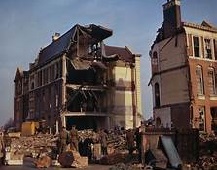ELMS Newsletter 16
Dorothy Wakeley FANY / SOE
In the summer of 1940, a stick of bombs was dropped near my home in an outer suburb of London. There were casualties. As an Air Raid Warden I was busy taking messages from those working in disaster areas, to ARP headquarters.
Directed to another road, I came to a house with all the windows blown out, and the glass strewn over the road. The local Ack-Ack guns were firing non-stop, and above us we could hear the drone of enemy aircraft coming in for another attack. But the lady of the house had spread a clean cloth on the front room table, and was placidly dispensing cups of tea to all of us working outside.
Back at home when the all clear had sounded in the early hours of the morning, we made tea for the neighbours taken in for the night. They were in shock, but the hot drink revived them, and they spoke of returning home. ‘But you cannot go home’ we protested, ‘your house is in ruins’. ‘Then there will be a lot of clearing up to do,’ they said, drinking more tea.
_______________________
In November 1940, I made the journey by early train to Coventry to visit a cousin, who, I had been told, was dying. There had been brief news that morning of a heavy air raid on Coventry. On arrival, I stared appalled, at the vast sea of devastation surrounding the cathedral which itself lay in ruins open to the sky. Just one wall was standing. So heavy had been the raid that whole streets were engulfed by fallen masonry. A dreadful silence hung over it all.
I wandered about in the rubble looking for a street sign still in place to show me where I was, and further away found the road where my cousin lived with his wife. His house appeared undamaged, apart from the roof. Greatly concerned, I greeted them both, saying how very sad it was to find them in such conditions. My cousin was clearly on his deathbed. He smiled up at me. ‘We are all right really, you know,’ he said ‘but you have had a bad time in London’. Could he possibly not know I wondered, of the desolation outside of his own front door, and remained silent on what I had seen. ‘Never mind,’ said his wife, who did know, ‘The electricity is off, but I can boil a kettle on the fire. I’ll make a nice cup of tea’.
__________________________
On a visit to SOE Headquarters in 1942, I was asked to tea by a FANY, whose elderly mother lived in a block of flats close to Baker Street. After a splendid tea of home-made scones – a rare treat – I asked if I might visit the bathroom, and was directed to a particular door on the upper floor of the maisonette. On reaching the top of the stairs I was faced with two closed doors in the area concerned, and after hesitating, and with some caution, opened the near one. It was fortunate for me that I took no step forward; because there was NOTHING there – nothing at all on the other side of that door, just open air and sky. A direct hit must have sheared away the rear of the building, and bomb clearance squads had removed the shattered rooms.
A little shaken I made my farewells, too aware of the attitude of Londoners to the blitz to refer to it. That indomitable old lady would not allow a direct hit to shatter her tranquillity, and she would continue to dispense tea and home-made scones with no talk of bombs in front of visitors.
It could be argued, that if Hitler had found a way to prevent supplies of tea from reaching beleaguered Britain, he might have stood a better chance of winning the war!

